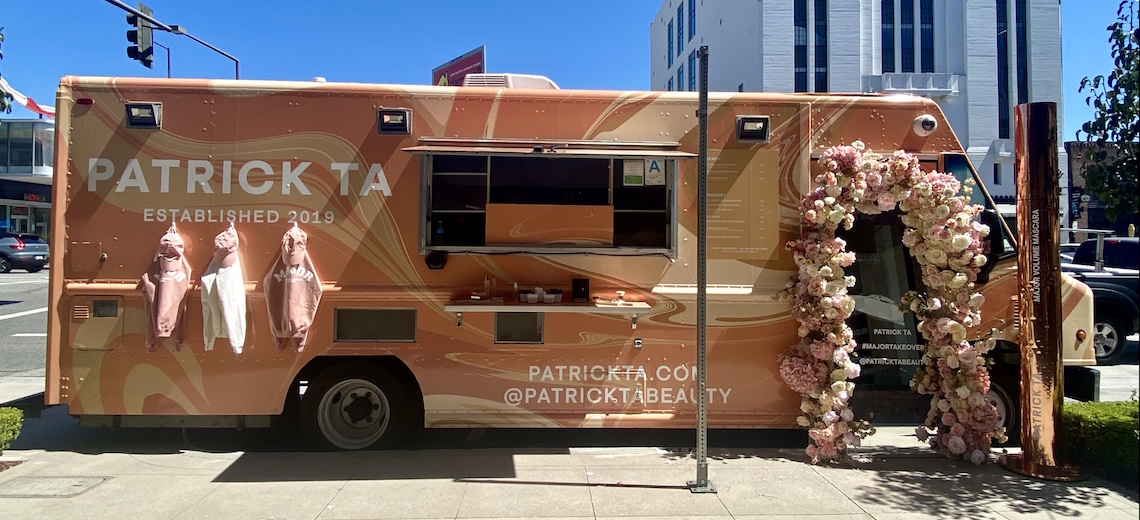A guerilla marketing technique inspired by millennials’ love of the food truck, the promo truck has replaced the beauty store pop-up for several brands during the pandemic.
Startups including Hero Cosmetics, Summer Fridays and Patrick Ta Beauty have all done truck promotions in the U.S. within the past three months. Most recently, Patrick Ta Beauty celebrated the launch of its new Major Volume Mascara with a mobile pop-up in Los Angeles from September 9-12, hitting up shopping hotspots including Fairfax, Abbott Kinney, Glendale and Melrose Trading Post. Already adopted by Chanel Beauty in pre-pandemic times, the promo truck is catching on among indie startups as pop-ups are only slowly starting to come back.
“This is our first and only consumer-facing, in-person experience that we have done during the pandemic,” said Ta. “We want to make sure that everyone is safe before we push in-person experiences during this time and the truck activation allowed us to feel safe, keep our consumers safe while also allowing us to engage with them.”
To generate hype for the mascara truck, the brand and Ta himself posted on Instagram the exact locations and times where it could be found. In addition to the mascara, the truck sold Patrick Ta merch and other products from the brand.
“These activations produce much stronger brand loyalty than digital marketing, so brands are trying to stand out in a crowded field,” said Ben Goldberg, president of Food Truck Promotions. The company worked on the Patrick Ta Beauty activation, as well as Chanel Beauty’s 2018 hot cocoa truck that generated 5 million media impressions.
Some brands do indeed offer food within their beauty activations. This summer, Hero Cosmetics hosted its “Sunscreen ’n Ice Cream” promotion with a truck that drove around six locations in New York and Los Angeles each, offering free samples of its newly launched sunscreen as well as ice cream.

Ad position: web_incontent_pos1
According to Amy Calhoun, vp of marketing at Hero Cosmetics, the truck was a better option during the pandemic because “it was outside, which allowed people to feel more comfortable engaging with the activity.”
Trucks are also helpful at a time when retail foot traffic numbers remain uncertain. “We could take it to places where our target audience was [sure to] be, rather than being forced into one location that could be hit or miss,” said Calhoun. The brand was able to hand out samples to 5,500 people with its promotion.
“There are many benefits to doing a mobile promotion versus a brick-and-mortar promotion during the pandemic. The most obvious is that with the rise of Covid comes the desire of consumers to be outdoors in a safe environment, where they don’t have to wear a mask or be afraid of catching Covid,” said Goldberg.
When Summer Fridays hosted its soft-serve truck promotion in July for its Lip Butter Balm launch, it generated $3 million in EMV, according to Blair Badge, the brand’s executive director of marketing. While physical promotions had been a big part of the brand’s pre-pandemic marketing strategy, this was the brand’s second in-person campaign since the pandemic began. In June this year, it hosted a socially distanced drive-in movie night with influencers and followers for its Jet Lag Mask relaunch.

Summer Fridays’ soft-serve truck activation in Los Angeles. (Emma Bassill)
Ad position: web_incontent_pos2
“We continue to monitor the state of the pandemic as a brand and will prioritize IRL activations as we feel it’s safe to do so. The health of our community and team are always top of mind,” said Badge.




